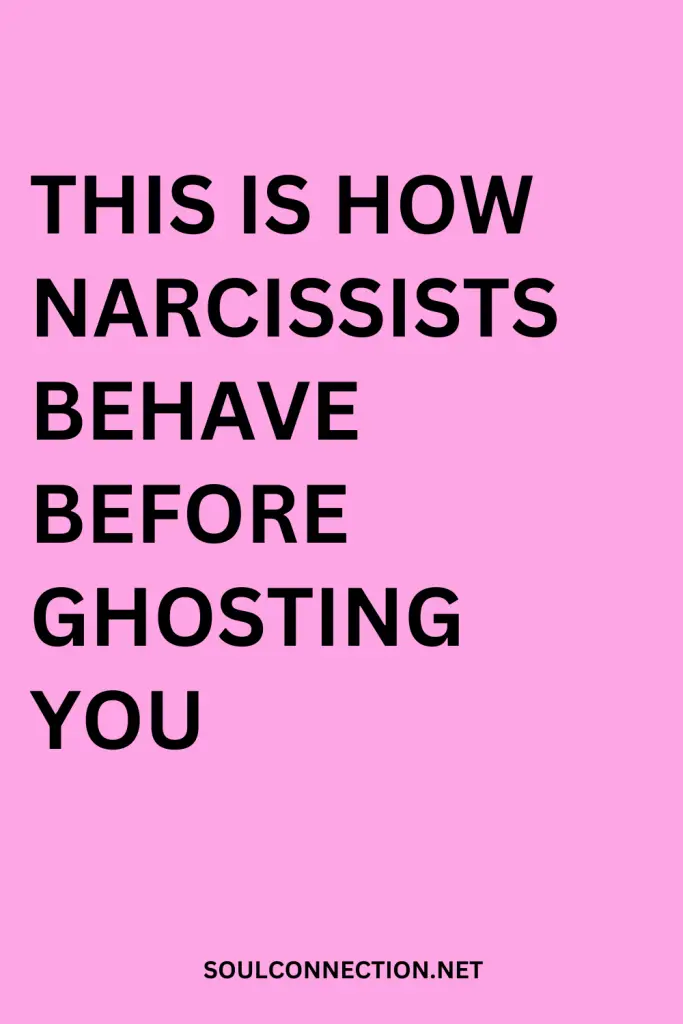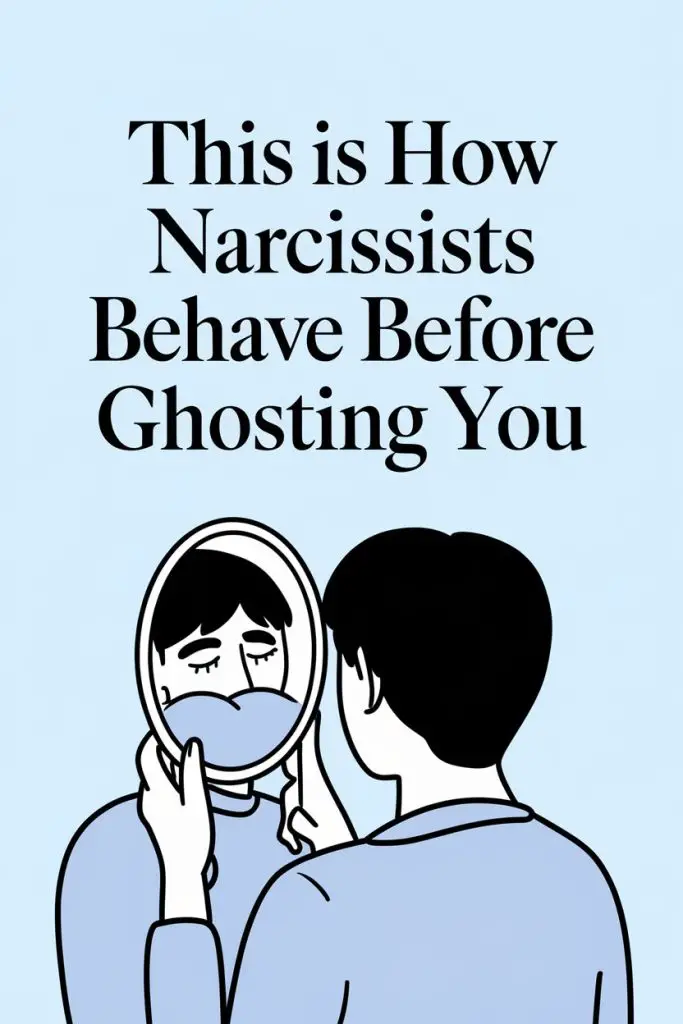There’s a unique brand of confusion that comes with being ghosted by someone you thought was pretty into you. If your would-be Casanova is a narcissist, well, you’ve just bought a ticket for the emotional rollercoaster.
Narcissists don’t just vanish—they deliver a masterclass in mind games before pulling their disappearing act. If you’re scratching your head, wondering if it was all in your head, you’re not alone.
Let’s shed some light (with a torch, not a red flag) on how narcissists behave before they ghost you, so you can see it coming—and maybe save yourself a lot of wondering, “Was it something I said?”
The Sudden Shift from Hero to Houdini
The early days with a narcissist can feel like starring in your own romantic comedy.
One minute, they’re showering you with compliments, affection, and promises that would make Shakespeare roll his eyes. Next minute? They’re slinking away faster than a cat in a bath.
What gives? Narcissists thrive on idealization—until they don’t. The moment they sense you’re emotionally invested or they spot a shiny new ego boost elsewhere, the mask slips.
They start pulling away, often with a whiplash-inducing change in attention, and suddenly you’re left reaching for the phone, wondering why your texts now read like echoes in an empty cave.
Breadcrumbs and Bare Minimums
Gone are the days of long, flirty texts and hour-long calls. Now you’re lucky to get a “k” in response. Narcissists excel at “breadcrumbing”—doling out just enough attention to keep you from calling them out or moving on.
They want you hanging by a thread, hoping for the next bread crust of affection.
This is less about genuine connection and more about control. If you notice your conversations have gone from deep and meaningful to “wyd?” at 2am, chances are, you’re being prepped for the chopping block.
Shifting the Blame
Feeling like everything’s suddenly your fault? Welcome to the narcissist’s favourite magic trick: blame-shifting.
Maybe you asked a simple question—“Hey, are we still on for Friday?”—and suddenly, you’re accused of being needy, clingy, or insecure. Narcissists love to make you doubt yourself.
They’ll twist your words, flip the script, and make you feel like you’re the drama queen if you ask for basic respect. This classic maneuver paves the way for their exit. After all, if you’re “too much,” disappearing is your fault, not theirs.
Convenient, right?
Mysterious New Priorities
Yesterday, you were their world. Today, they’re suddenly “so busy.” Work, family, that new hobby they picked up five minutes ago—there’s always something more important than spending time with you.
Narcissists don’t just vanish—they start planting seeds of excuse. You’ll notice a sudden, suspicious uptick in “emergencies.” These are rarely real; they’re just prepping you for minimal contact and, eventually, radio silence.
If you’re starting to feel like an option rather than a priority, take note. This is classic narcissist preparation: lowering your expectations so their exit feels less dramatic (for them, anyway).
Picking Fights Out of Nowhere
Ever feel like every conversation is turning into a debate club showdown? Narcissists often manufacture conflict before a disappearing act.
Tiny issues explode into arguments. Innocent comments suddenly warrant the silent treatment or a full-on meltdown.
Why? Because conflict makes distancing themselves easier. If you’re mid-fight, vanishing feels less like abandonment and more like “taking space.” Plus, turning you into the villain justifies their Houdini act.
You might even end up apologizing for things you didn’t do—another notch in the narcissist’s well-worn ego belt.
Rampant Hot and Cold Behavior
Few things mess with your head quite like someone who’s sweet one hour and frosty the next. Narcissists are Olympic-level mood swingers. One day, you’re their soulmate; the next, they barely acknowledge your existence.
This push-pull dynamic keeps you guessing, destabilizes your sense of security, and gets you hooked on their approval. It’s not love—it’s emotional Las Vegas.
And once you’re hooked? The ghosting is almost a relief, if only because the drama stops.
Attention-Seeking Elsewhere
You might notice their social media presence becomes suspiciously lively.
New friends, new fans, a parade of likes from people you’ve never heard of—narcissists need constant admiration, and when your supply starts running low (or you’re starting to see through them), they look elsewhere.
If they’re suddenly collecting admirers like Pokémon cards, you’re probably being edged out. This isn’t about you—it’s about their never-ending appetite for attention.
Gaslighting Goes Into Overdrive
Narcissists hate being called out, especially when their investment in you is waning. They’ll insist everything’s fine, that you’re imagining things, or that you’re “too sensitive.” You might even start questioning your own judgment.
Gaslighting is a narcissist’s favourite power tool. It keeps you unstable and doubting yourself—making it much easier for them to vanish without facing the consequences.
Withholding Affection and Validation
Remember those early days of endless praise, cuddles, and attention? That well dries up fast. Suddenly, affection feels harder to come by than a unicorn in a haystack.
Narcissists start holding back emotional (and sometimes physical) intimacy as a way to punish and control. This withdrawal isn’t accidental—it’s a calculated move to make you chase them, all while they’re quietly plotting their exit.
The Grand Disappearing Act
The signs have been there all along, but the final act is always the same: silence. No warning. No explanation. Just gone.
Narcissists ghost not because they’re confused or scared, but because accountability is kryptonite to them. They’d rather vanish than have an adult conversation about why things aren’t working.
It’s not about closure—it’s about control. Ghosting gives them the final word, even when they’re not speaking.
What You Can Do Tonight
Spotting narcissistic behavior before being ghosted can feel like reading subtitles in a film with the sound off. The signs are there, but believing what you’re seeing is the hard part.
If you recognize these patterns, trust your gut. You’re not “too sensitive” or “crazy”—you’re catching on. Start shifting your focus away from decoding their mixed signals and onto your own needs.
Get support from friends or even a therapist who understands narcissistic dynamics.
Try not to chase answers from someone who’s shown a pattern of withholding them. Instead, give yourself the closure they never will. Block, delete, or mute as needed.
Pour your energy into people who actually show up for you—no breadcrumbs required.
And next time someone’s attention feels too good to be true, it just might be. But at least you’ll spot the warning signs before the curtain falls.
Ghosting stings, but a narcissist’s disappearing act doesn’t get the final say on your worth. That’s your job—and you’re more than up for it.


